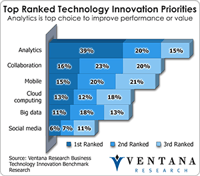Information technology for business is changing rapidly as organizations demand innovation to help them discover insights and facts. Our research into business technology innovation found analytics to be the top priority in 39 percent of organizations. Businesses feel pressure to be better, faster and smarter in operating processes, and understanding their various types of information is a key to success. Businesses are looking to capture value from all types of information both within the...
Read More
Topics:
Big Data,
Event discovery,
Operational Performance Management (OPM),
Analytics,
Business Analytics,
Business Intelligence,
CIO,
Information Management,
Location Intelligence,
Operational Intelligence,
Visualization,
Business Performance Management (BPM),
Customer Performance Management (CPM),
Data,
Data Discovery,
Financial Performance Management (FPM),
Information Applications (IA),
Information Discovery,
Information Management (IM),
Sales Performance Management (SPM),
Supply Chain Performance Management (SCPM),
Workforce Performance Management (WPM)
The increasing volume of information within enterprises and on the Internet requires businesses to be smarter and more efficient in how they use it. One large challenge is navigating through information and access to the data underlying key business documents in a way that people actually think and operate. The traditional technology approach is defining a data model with a database and then mapping the data to it and is not capable of dealing with data from diverse unstructured information...
Read More
Topics:
Social Media,
Sustainability,
Business Analytics,
Business Collaboration,
Business Intelligence,
Business Mobility,
Business Technology,
CIO,
Cloud Computing,
Governance, Risk & Compliance (GRC),
Information Applications,
Information Management,
Information Technology,
Location Intelligence,
Operational Intelligence,
Business Performance Management (BPM),
Cambridge Semantics,
Customer Performance Management (CPM),
Data Virtualization,
Financial Performance Management (FPM),
Informatics,
Information Applications (IA),
Information Discovery,
Information Management (IM),
IT Performance Management (ITPM),
Sales Performance Management (SPM),
Supply Chain Performance Management (SCPM),
Workforce Performance Management (WPM)











